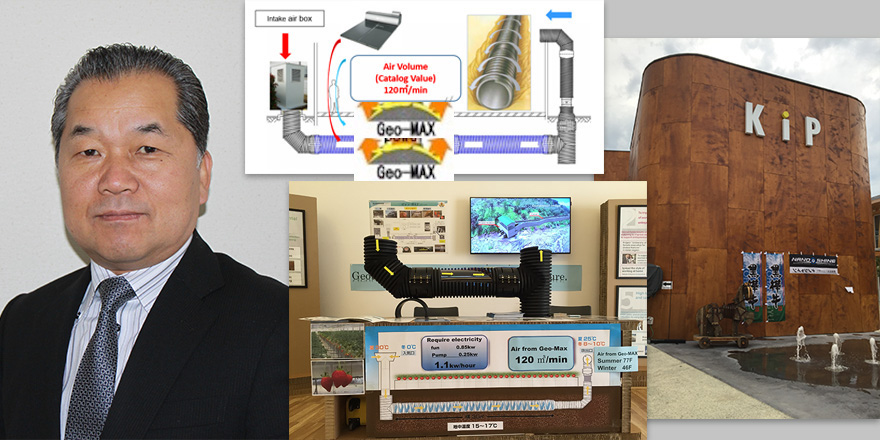This advertorial is part of IDN’s media project jointly with Global Cooperation Council and DEVNET Japan.
TOKYO – The increased occurrence of severe hot weather and record heat waves is creating disastrous situations for many people, but in some areas they do not possess sufficient resources – such as air-conditioning facilities and electricity to run those facilities – for protecting themselves. Solving the lack of access to air-conditioning systems will help thousands of people cope with global warming.
In December 2015, the United Nations Climate Change Conference (COP21) in Paris adopted the ‘Paris Agreement’ with the aim of keeping global temperature rise this century well below 2 degrees Celsius and stimulating efforts to limit the temperature increase even further to 1.5 degrees Celsius above pre-industrial levels.
According to the ‘Paris Agreement’, countries should “aim to reach global peaking of greenhouse gas emissions as soon as possible” and “achieve a balance between anthropogenic emissions by sources and removals by sinks of greenhouse gases in the second half of this century”.
Global warming is widely held to be caused by so-called ‘greenhouse gases’ emitted through the use of fossil fuels. To reduce the total use of such fuels, there has been a drive to use renewable energies generated by alternative sources such as solar and wind power while the automobile industry, for example, has made huge strides in converting vehicles to hybrid or all-electricity powered engines. However, it is necessary for more industrial sectors and technologies to join in actions to limit the temperature rise to 2 degrees Celsius.
One of the promising areas in the battle against greenhouse gas emission is geothermal energy for use in, for example, air-conditioning systems installed in factories, offices and residential buildings, and in the agricultural sector in horticultural greenhouses.
Energy-efficient air-conditioning systems using renewable energies such as geothermal power can be a strong driver for promoting ‘managed agricultural systems’ which mitigate food scarcity and poverty in the developing world but their widespread use has been limited due to installation difficulties and costs.
Japanese company Ikeda Technical Co. Ltd., led by CEO Mitsugi Ikeda, has now developed an innovative air-conditioning system called Geo-MAX, the idea for which came from the study of conditions in limestone caves, which are known for their stable cool temperatures and do not generate greenhouse gases.
Geo-MAX uses φ800mm polyethylene pipes around which ground water channels are spirally installed and these pipes are buried horizontally underground. Outdoor air is inhaled by a fan fixed to the outer end of the pipes exchanging heat in and out. Given that this involves ‘passive’ heat exchange rather than the use of heat pumps, the system’s running cost is usually very low. Given groundwater temperature at 15℃ and outside air at 35℃, Geo-MAX supplies air approximately at 26℃, with a volume of 120㎥/min, functioning as a heater in cold conditions and cooler in hot conditions.
Unlike other geothermal-based air-conditioning systems such as borehole-based systems, which usually require a burial depth of 5 to 100 metres from ground level and thus high installation costs, Ikeda Technical’s patented Geo-MAX technology artificially recreates the conditions of a limestone cave just 2 metres below the ground, with a substantial reduction in installation costs.
Other shallow depth systems, such as slinky coil systems and horizontal installation systems, have lower installation costs than borehole-based systems, but they do not overcome the problem that heat retained from the ground is easily exhausted and disappears. Thus, pump-based geothermal heat systems still generally tend to incur high running and maintenance costs. Even the cool-tube system – which is one of the main passive geothermal heat exchange systems which does not use heat pumps – suffers from the same setback of early exhaustion of geothermal heat.
The Geo-MAX system overcomes the issue of durability by having a constant flow of underground water around the polyethylene pipes and this water keeps the temperature of the air inside the pipes settled for a much longer duration. Geo-MAX benefits from an innovative combination of several long-known low-cost technologies and thus requires very few running and maintenance costs.
Geo-MAX can be installed for various types of facilities from large-size buildings such as factories, schools and residential houses, as well as in agriculture for horticultural greenhouses, as a stable air-conditioner.
In Japan, Geo-MAX has already been adopted in a food-processing factory, a mechanical factory, a care house for the elderly and greenhouse farms. In South Korea, it has been installed in a moulding factory.
Geo-MAX’s experience with installation for private companies has already demonstrated that this innovative system meets cost as well as energy efficiency requirements. For companies and organisations, which are sensitive to the concept of Corporate Social Responsibility (CSR), Geo-MAX represents an air-conditioning system that is a viable alternative to existing systems.
In August 2015, Ikeda Technical participated in EXPO 2015 in Milan, Italy, with a booth at the KIP Pavilion, where it demonstrated the innovative Geo-MAX technology. We were able to confirm that Geo-MAX is the only system with a high potential for becoming the next air-conditioning standard worldwide. Geo-MAX contributes to reducing greenhouse gas emissions in line with the aims of the ‘Paris Agreement’ and helps build food-supply stability in developing countries. (4 February 2016)
Contact: IKEDA TECHNICAL CO. LTD
Morimoto BL., 602,3-9-3, Uchikanda, Chiyoda-ku Tokyo, 101-0047, Japan
Tel: +81-3-5244-4785 Fax: +81-3-5244-4786
Email:Tokyo.Japan@geo-max.co.jp
URL: http//ikedatechnical.hp.gogo.jp

